#Napoleon's Military Career
Explore tagged Tumblr posts
Text
Happy birthday Marshal Davout! May 10, 1770
For his birthday I have a few excerpts and even a picture from Napoleon's Military Career by Montgomery B Gibbs. (In this book, the spelling of Davout is Davoust)
At Jena:
Davoust's plans were so well laid, and his generals and troops displayed such courage and skill, that Blucher, with 12,000 cavalry, had not the satisfaction of penetrating through a single company.
At Eylau:
At the moment when the Russians appeared to be the victors, Davoust's division, which had been manoeuvring since the beginning of the action to turn the left and gain the rear of the Russian line, now made its appearance on the field. The effect was sudden and demoralizing to the Russians; Serpallen was lost, the Russian left wing, and a portion of its centre were thrown into disorder, and forced to retire and change front.

In Russia, when the Kremlin was surrounded by flames:
"It was then," says Segur, " that we met the Prince of Eckmuhl (Davoust). This marshal, who had been wounded at the Moskowa, had desired to be carried back among the flames to rescue Napoleon, or to perish with him. He threw himself into his arms with transport; the Emperor received him kindly but with that composure which in danger he never lost for a moment."
#napoleonic marshals#marshal davout#davout/davoust#louis nicolas davout#happy birthday#Napoleon's Military Career#Montgomery B Gibbs
37 notes
·
View notes
Text
Tumblr Biography: Napoleon 🇫🇷
🎖️ Promoted to Brigadier General 👨✈️ at just 24, Napoleon was put in charge of the artillery of 🇫🇷 France's Army of 🇮🇹 Italy. But could he lead them to 🏆 victory against overwhelming odds❓
#brigadier general#leadership#ranking#general#experience#experienced#decorated#tactical#commission#authority#responsibility#veterans#brass#uniform#salute#military service#public servant#career advancement#french army#french aristocracy#grande armée#french empire#napoleons marshals#conquest#soldiers#cavalry#infantry#artillery#conscription#tactics
0 notes
Text
The life of Jean-Andoche Junot
Since I have exceeded the limit of links I can put in the history post catalogue in my pinned post, I'm making a separate post to catalogue everything I've translated and uploaded on Junot!
I will put a flower next to the most important posts 🌷
general information:
Junot's head injuries 🌷
was Junot bisexual?
my refutation of the theory that Junot had syphilis
British caricatures of Junot
early life:
Junot's birth and baptism 🌸
Junot's ancestry
schoolboy memories 🌸
Junot's older brother
Junot in 1789 🌸
relationship with Napoleon:
a note from Napoleon to Junot, 1794
Junot on his attachment to Napoleon 🌹
'Orestes and Pylades'
an anecdote on young Napoleon, Junot and Marmont 🌹
Napoleon and Junot in Italy
Napoleon insults Junot's scars 🌹
a letter from Junot to Napoleon, 1812 🌹
a letter from Junot to Napoleon on his denouncement + Laure's letter on the denouncement 🌹
military and diplomatic career:
Junot's heroic deed in 1794
Junot gets injured at the battle of Lonato, 1796 🌺
Junot meets the Directory
Junot's friend gets assassinated
The battle of Nazareth
a poem on the battle of Nazareth
Junot's helps an Englishman to evade arrest 🌺
Junot as ambassador to Lisbon
Austerlitz 🌺
Napoleon and Wellington's opinions on Junot's actions at the Convention of Cintra 🌺
Junot's 1811 facial injury 🌺
a letter from Wellington to Junot 🌺
an Englishman's opinion of Junot
Junot's defence of his actions at Smolensk 🌺
personal life and interests:
Junot's art collection 🌸
Junot's rare books collection
Junot's talent with a pistol
romance with an Englishwoman 🌸
Junot, Josephine and Hippolyte Charles in Italy
Junot's ghostly encounter
a murder attempt on Junot
Junot stands up for his friend 🌸
Junot's love affair with Xraxarane 🌸
Junot's duel in Egypt 🌸
Junot and Laure's wedding 🌸
an anecdote on pregnancy and pineapple
Junot's friendship with Hippolyte Charles
a letter from Junot to Hippolyte Charles 🌸
Junot's affair with "Mlle V"
Junot takes an acting class 🌸
Junot, Pauline and Caroline
the Chateau du Raincy
Junot's affair with Caroline 🌸
Junot’s famous handwriting
signature as Duc d'Abrantès
a luxury pocket watch
later life and death:
a letter from Junot to Laure on his hopes for a peaceful retirement 🥀
a letter from Junot to his daughter Constance, 1812 🥀
a letter from Junot to Napoleon on his denouncement + Laure's letter on the denouncement
a contemporary impression on Junot in Illyria - 'Achilles' 🥀
Illyria, Icepit, insanity 🥀
the house where Junot died
Laure’s letters on Junot’s death
Junot's original death notice
Junot's grave and funerals 🥀
137 notes
·
View notes
Text

Congratulations to President Donald J. Trump on the biggest political comeback since Napoleon escaped Elba.
The stakes were so astonishingly, unprecedentedly high, with the justice system weaponized against him, along with the entirety of the corporate media, and yet somehow the word still got out, the people saw through the lies they were being fed, and rallied around him.
He survived two assassination attempts, relentless persecution, outrageous financial cost, banana republic fines and false arrest, but somehow he prevailed, in the face of overwhelming odds, in a way no career politician ever would have.
When Elon and others said that this might well be the last election, to some it sounded like typical election year hyperbole, but I think they were right, and that the entire world dodged a bullet today. I shudder to think what would have happened had the DNC succeeded in installing their drunken hyena puppet: America's freedom of speech would truly have been over; Twitter would have been shut down; all dissent at the madness of the left would have been prosecuted as 'hate speech', and the wars in the world would have kept on escalating, likely until WWIII with Russia and whoever else the Military-Industrial Complex next decided to attack.
The path of the future has been dramatically changed today, and it was by no means a sure thing, so the result has singlehandedly renewed my faith in Democracy.
79 notes
·
View notes
Text
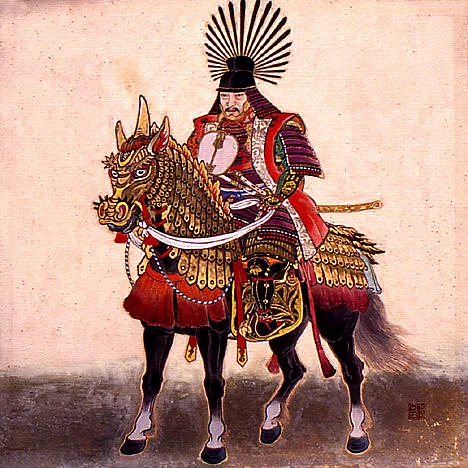
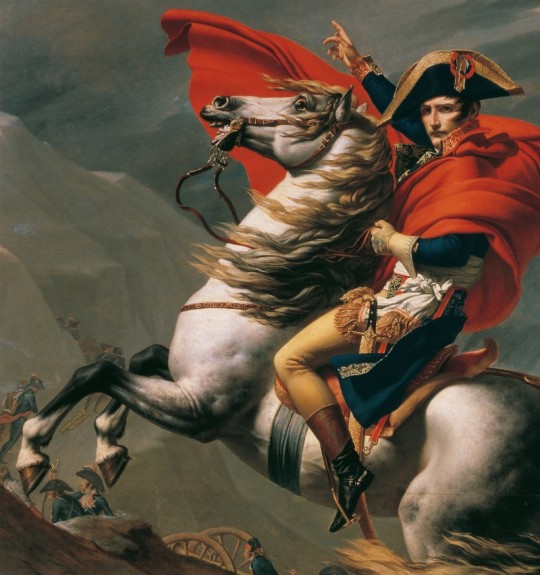
So I know I haven't been so active in the Napoleonic community in recent months, as I've been pretty absorbed with studying Japanese history and the Japanese language, but the more I've learned about Hideyoshi, the more I found myself comparing him to Napoleon, so here's a post where my two main historical interests get to intersect. :)
Toyotomi Hideyoshi has often been referred to as Japan’s Napoleon Bonaparte. Perhaps a bit Eurocentric given that Hideyoshi was born in 1537, 232 years before Napoleon--if anything it could be said that Napoleon was France’s Hideyoshi, but unfortunately Hideyoshi is not a name most Westerners recognize—otherwise it’s an excellent comparison. I’ve read a great deal about Napoleon over the past several years, and, although my studies on Sengoku Japan are only really in their infancy, I couldn’t help but notice a striking number of parallels and similarities between the lives and military/political careers of Hideyoshi and Napoleon.
Both men came from relatively humble origins and experienced meteoric rises through the ranks via their military service. Napoleon’s family on Corsica were minor nobility—they were not wealthy by any means but at least possessed enough connections to get Napoleon into a military academy; once his training was completed, he was commissioned as an artillery officer. Hideyoshi was born a peasant; his father was an ashigaru (foot soldier) who served a samurai. Hideyoshi followed in his father’s footsteps and became an ashigaru himself, which at the age of 26 brought him into the service of Lord Oda Nobunaga, who was soon the most powerful daimyo in Japan. His talents and intelligence impressed Nobunaga, and Hideyoshi rose to become one of his top generals and retainers by his early thirties. When Nobunaga was betrayed and assassinated in 1582, Hideyoshi, then 35, moved quickly to step into the ensuing power vacuum; within three years he had defeated his main rivals, consolidated his power, and become the most powerful man in Japan himself. Napoleon Bonaparte became a general at age 24 and crowned himself Emperor of the French at age 35. Hideyoshi was never Emperor, nor, being from a peasant background, did he receive the title of shogun, but he was designated kampaku (Imperial Regent) by the Emperor at age 38 and was the real power in the land from this point until his death in 1598.
As a result of their respective meteoric rises and remarkable military successes, both men came to view themselves as destined for greatness. Napoleon frequently spoke of destiny and believed himself guided by it. “Is there a man so blind,” he wrote in December of 1798, “as not to see that destiny itself guides all my operations? Is there anyone so faithless as to doubt that everything in this vast universe is bound to the empire of destiny?” (Broers, Napoleon: Soldier of Fortune, 195) This belief, which pervaded through his life, also made him take great risks, convinced that he was destined to succeed in his endeavors. Hideyoshi came to genuinely believe his own rise was divinely inspired and even developed his own backstory, giving himself celestial origins, and making sure to mention them frequently in his letters to others as a means of convincing them of the rightness of his cause. “At the time my mother conceived me,” he wrote on one occasion, “she had an auspicious dream. That night, a ray of sun filled the room as if it were noontime. All were overcome with astonishment and fright and when the diviners had gathered, they interpreted the event saying: when he reaches the prime of life, his virtue will illuminate the four seas, his authority will emanate to the myriad peoples.” (Berry, Hideyoshi, 9). He even went so far as bringing up his supposedly heavenly origins in a letter to the King of Korea, in hopes of pushing his case to the King to permit his armies safe passage through Korea so he could carry out his planned conquest of Ming China.
Both were regarded as military geniuses by their contemporaries. Napoleon’s quick, dominant successes in Italy, and his crushing victories against Austria, Russia, and Prussia between 1805-1807, solidified his reputation as one of the greatest generals in European history, and arguably the best military commander of his time. Hideyoshi never suffered a defeat in the numerous campaigns he waged over the years to complete the work of unifying Japan that had begun under Nobunaga.
Likewise, both men’s reputations for military genius were severely tarnished by campaigns driven out of an increasingly megalomaniacal drive for conquest abroad. Hideyoshi, his confidence bolstered by his string of military successes, began setting his sights on China, and even hinted in his correspondence that one day, after China had submitted as his vassal, he might even attempt to conquer India. To begin his conquest of China, he first needed to bring his armies through Korea. He attempted to negotiate with the King of Korea to gain safe passage for his armies, but Korea had strong ties to the Ming Dynasty, the negotiations soon broke down, and Hideyoshi sent his armies to invade Korea in 1592. The Japanese initially smashed through the pitiful Korean defenses and made a rapid drive up the peninsula, but with Ming reinforcements soon arriving to turn the tide, and the Japanese navy being repeatedly pummeled by the brilliant Admiral Yi Sun-Sin, the Japanese advance was soon stalled. Eventually the Japanese forces retreated to the southern coastline, where they hunkered down in hastily-built fortifications while peace negotiations dragged out for years between Hideyoshi’s court and the Ming court. When these negotiations also eventually broke down, Hideyoshi launched a second invasion of Korea, less for the sake of conquering China this time than simply for punishing Korea as much as possible for thwarting his initial plans. Hideyoshi himself never actually personally led his armies in Korea—he never went to Korea at all—but relied instead on the reports of his generals and inspectors, whose reports often downplayed or whitewashed the truth of Japanese defeats out of fear. Additionally, some of his primary commanders (like Konishi Yukinaga and Kato Kiyomasa) openly hated each other and their quarrels and personal rivalries occasionally hampered military operations, not unlike the quarrels of Napoleon’s commanders in Russia. The second invasion was turning into a stalemate when Hideyoshi abruptly died in September of 1598 at the age of 61. The remnants of the Japanese army eventually returned to Japan, and a six-year period of nearly relentless horrors and atrocities in Korea had all been for nothing. Napoleon, of course, launched his infamous 1812 invasion of Russia, which, while of much shorter duration than Hideyoshi’s war(s) in Korea, led to a much more thorough destruction of his armies and arguably contributed to his fall from power in 1814. Not that the Korean conflicts left the Toyotomi forces unscathed, and it can also be argued that the extent to which the Western armies had bled themselves out in Korea helped contribute to the victory of Hideoyoshi’s rival, Tokugawa Ieyasu, against his Toyotomi-loyalist enemies at Sekigahara in 1600, as Ieyasu, based in Japan’s eastern Kanto region, had pointedly kept his own forces out of the war.
Both men enacted sweeping reforms in their respective societies which long outlasted either them or the dynasties they both failed to leave behind. Both initiated nationwide cadastral surveys and land registries to make tax collection more accurate and efficient. In 1595, six leading daimyo under Hideyoshi drafted, on his behalf, a code comprised of fourteen brief articles, all of which were centered around keeping the peace, carrying out justice, and governing the behavior of the various social classes in Japan. Napoleon issued his civil code (also not written by himself), now known as the Napoleonic Code, in 1804. While not as brief as the Toyotomi regime’s code, it was written in the vernacular to make it more accessible to the average person.
Both were patrons of the arts; in Hideyoshi’s case, of Noh theater (which he became so passionate about he eventually even performed in plays in front of his subordinates), tea ceremonies, and painting; Napoleon also patronized painters, established art museums and, while not up to becoming a performer in his own right like Hideyoshi, he did attend the opera regularly.
Both Hideyoshi and Napoleon struggled to produce an heir. Hideyoshi’s only son, Tsurumatsu, died at the age of 2 in 1591. Hideyoshi named his nephew Hidetsugu his heir in the meantime, but hoped to have another son. Neither his wife nor his considerable number of concubines were able to give him a child, leading historians to speculate that Hideyoshi may have been sterile by this point, possible as the result of a sexually transmitted disease. In 1592 his concubine Yodo-dono, also known as Chacha, gave birth to a son, Hideyori, who would become Hideyoshi’s only heir (the unfortunate nephew, Hidetsugu, was soon charged with treason and forced to commit seppuku not long after Hideyori’s birth). Hideyoshi’s inability to create an heir with so many other women led to rumors spreading, even before he died, that Hideyori was not really his child. Napoleon also struggled to produce an heir for years after crowning himself Emperor, but, as he demonstrated no problem creating sons with his mistresses, the problem was attributed to his wife’s infertility. He divorced Josephine, married a much younger princess, and soon enough had an heir of his own.
When Hideyoshi died in 1598, his heir was only five years old; when Napoleon fell from power in 1815, his heir was four years old. Both Hideyoshi’s heir and Napoleon’s heir died at the age of 21.
#Toyotomi Hideyoshi#Napoleon Bonaparte#Napoleon#Napoleonic wars#Sengoku Jidai#history#military history#Japanese history#samurai
54 notes
·
View notes
Text
Jack Reed

Physique: Average Build Height: 5'6" (1.68 m)
John Francis "Jack" Reed GOIH (born November 12, 1949) is an American lawyer and politician serving as the senior United States senator from Rhode Island, a seat he was first elected to in 1996. A member of the Democratic Party, he was the U.S. representative for Rhode Island's 2nd congressional district from 1991 to 1997. Best known for his repeated efforts to set a deadline for the withdrawal of American military forces from Iraq. He is the dean of Rhode Island's congressional delegation.





Cute little guy whose diminutive height makes him a perfect pocket daddy. Born and raised in Cranston, RI and grew up on Pontiac Avenue, Reed graduated from the United States Military Academy and Harvard University, serving in the U.S. Army as an active officer from 1971 to 1979.



Now, what exciting facts can I tell you about Sen. Reed? Well he's married to Julia Hart Reed and together they one daughter. He is a graduate of West Point. Over the course of his military career, he earned the Army Commendation Medal with Oak Leaf Cluster, Ranger Tab, Senior Parachutist Badge, and Expert Infantry Badge.




With diminutive height 5 feet 7 inches on a good day, makes his Special Forces background seem both improbable and all the more intimidating. So he probably has a Napoleon complex and would pound you into the bed to prove his worth. And I can work with that. Come on Jack, show me what a big man you are.

80 notes
·
View notes
Text


Arthur Wellesley:
"So, I saw that you had no propaganda for the Iron Duke himself and thought that should be corrected, because I cannot let this man go unloved.
He is the ultimate sexyman. I don't really get that title or the requirements but I do know this man and he is the ultimate in Regency-era sexiness.
Field Marshal Sir Arthur Wellesley, First Duke of Wellington, whose full list of titles merits its own Wikipedia page, he had so many (including Prince of Waterloo of the Kingdom of the Netherlands), was so well known for his debonairness that he was often called "the Beau" or Beau Wellesley.
Our dear Duke with his eyes of "a brilliant light blue," is quite the underdog made good. The fourth son of an Anglo-Irish aristocratic family, he was a bit of a loner as a child, whose star was eclipsed by the academic success of his older and younger brothers. Yet he had a remarkable talent for the violin, which as we know from Mrs. Jefferson is quite a good quality for a man to have. As a young man he was considered extremely good humored and drew "much attention" from female society. The Napiers of Celbridge thought he was a "saucy stripling" and he was also considered quite mischievous. Yet he also had a rich inner life, reading and contemplating the great philosophers of the day.
Yes, we know about his military victories in the Peninsula (the position of Field Marshal of the British Army and the accompanying baton were created for him) and his success at Waterloo, but he was also both romantic and a ladies' man. (I could go on about the military success but that's not really what this is about, is it?)
Want the romantic side? He fell in love with Kitty Pakenham while a lowly aide-de-camp in Dublin but, with no real position or prospects, was laughed away by her brother when he sought to marry her. In a fit of pique he destroyed his violin and turned firmly toward progressing his career. Over a decade later, after he had made something of himself in India, he learned she hadn't married, supposedly because she was still pining for him. Reader, he married her, despite thinking she'd grown ugly, and got two children from her in less than two years. I'm not kidding, this man was virile. They married in April of 1806, their first son was born in February, 1807, and their second son was born in January 1808. Although he wasn't sexual faithful to her, Wellington wore an amulet she gave him for over twenty years, and was still wearing it when he sat with her on her deathbed. When she was surprised he still wore it, he told her if she'd just bothered to check in the last twenty years, she'd have found it. Despite surviving her by twenty years, the Duke never remarried.
Now, please don't think badly of him for the lack of sexual fidelity. It was the Georgian era. Sexual fidelity was not a part of marriage in high society. Men didn't sleep only with their wives and some wives could be quite happy with that (for one, it's much easier not to have one pregnancy after another when your husband is sleeping with someone else). Not that women weren't also sleeping around. Which brings me to one of Wellington's more… interesting conquests: Lady Caroline Lamb, wife of William Lamb (the future Second Viscount Melbourne and Prime Minister). Why do I know that name, you ask? The OG pixie manic dream girl, Caro's much more notably known for her affair with Lord Byron. After that particular bit of nonsense, she was in Brussels with the rest of the English aristocracy during the 100 Days/post Waterloo. She and the Duke supposedly slept together and she took his cloak away as a souvenir.
Who else did the Duke liaise with? Well, there were the usual flings with actresses and singers, such as La Grassini. As previously noted in another post on this tumblr, he was noted as a stronger, better lover than Napoleon by another of their mutual lovers. Wellington also was a client of Harriette Wilson. He visited her when she was in Paris after the Duke of Beaufort bought her off, though this was before Beaufort stopped paying her, prompting her to publish her memoirs. She canvassed her old lovers, including Wellington, to see if they'd pay her not to be in them. Wellington send her a note in return saying "Publish and be Damned." Something about his succinct dismissal of her is just so hot.
Oh, want a bit more of Wellington being a bad boy? In 1829, while Prime Minister, he got into a duel that still is commemorated almost two hundred years later. King's College, London, was set up while Wellington was also advocating for Catholic Emancipation and this led to Lord Winchilsea publicly insulting Wellington's honor to the point that the Duke (who'd never dueled before or supported dueling generally) called him out. They went to Battersea Fields and settled the matter with pistols. Wellington won and Winchelsea apologized. King's College celebrates "Duel Day" every March.
Even better, want to read about Elizabeth Bennet and the Duke being witty and falling in love? Complete with scenes of the Duke showing he knows what to do with his cannon? Then let me recommend the third variation of An Ever Fixed Mark, A Dalliance with the Duke. I dare you not to vote for him for all eternity with that portrayal in your head."
Emma, Lady Hamilton:
a. “Her boyfriend got bored with her and passed her onto his uncle. Reader, she married him, and started having threesomes with Lord Nelson. She basically bullied her way into social acceptance despite being a former courtesan. Also, she was hot as hell.”
70 notes
·
View notes
Photo

Napoleon Bonaparte During the Early French Revolution (1789-1794)
Of all the careers that soared to meteoric heights during the chaotic decade of the French Revolution (1789-1799), none was more spectacular nor impactful than that of Napoleon Bonaparte (1769-1821). From an unremarkable birth into minor Corsican nobility, Napoleon would find in the Revolution a path to fame, military success, and ultimately, to his role as Emperor of the French.
A quick glance at his career would be enough to show how intertwined his fate would become with the Revolution. His promising performance at the Siege of Toulon in 1793 would lead to his brilliant command of the Army of Italy, which in turn would help provide him with enough popularity and influence to seize control of the government in the Coup of 18 Brumaire, the event which many scholars consider to be the end of the Revolution. To understand this version of Napoleon, it is necessary to look at the person he was at the start of the Revolution; hardly the picture of a dashing military commander or French patriot, the Napoleon of 1789 was a thin, awkward man who did not yet even consider himself French.
Indeed, in 1789, 20-year-old Napoleon was in something of an identity crisis, looking to reconcile his ambitions of literary fame with his education as a soldier, his devotion to French revolutionary ideals with his Corsican nationalism. The early Revolution was undoubtedly a time of personal development for the young artillery lieutenant, the outcome of which would not only affect his own future but also the fate of all of Europe.
The Corsican
In 1768, the year before Napoleon's birth, the Kingdom of France purchased Corsica from the Republic of Genoa, which had distantly ruled it for the previous few centuries. Although nominally under Genoese control, the Corsicans had been used to effectively ruling themselves. They had recently claimed independence, declaring the Corsican Republic in 1755, but such aspirations to self-rule would come to an end with the arrival of the French. In Napoleon's own words, he was born "as the fatherland was dying. Thirty thousand Frenchmen, vomited upon our coasts, drowning the seat of liberty in torrents of blood" (Bell, 18).
There was resistance, of course. Led by Pasquale Paoli (1725-1807), the Corsicans were initially successful at beating back the French Expeditionary Force that landed on their shores in 1768. However, this success would not last, as the French had the advantage in manpower and supplies; the French victory at the Battle of Ponte Novu in 1769 destroyed the Corsican will to fight. Although sporadic guerilla warfare continued, Paoli fled to Britain, and Corsica was annexed by France.
Although this defeat was lamented by many Corsicans, some were able to take advantage of this regime change. Napoleon's father, Carlo Buonaparte, was one of them. A former ally of Paoli, Carlo chose to abandon the patriotic cause to ensure a future for his family. His gamble paid off, as Carlo's devotion to the new government allowed him to secure minor nobility status for his family under French law, which in turn allowed him to send his oldest sons to receive education in French royal academies. Because of his father's change in loyalties, ten-year-old Napoleon was educated at the military academy of Brienne in northern France, where he learned French and excelled in mathematics. Paoli, however, would not forget nor forgive Carlo's apparent betrayal.
Despite reaping the benefits of French occupation, teenaged Napoleon remained a staunch Corsican nationalist. He idolized the exiled Paoli as a freedom fighter and clung to dreams of an independent Corsica. Such a demeanor, along with his strange accent and difficult-to-pronounce name (recorded in the school registry as Neapoleonne Buonaparte), quickly alienated Napoleon from his French classmates. Much of his time was spent alone, and he would soon develop a “thoughtful and gloomy” nature, according to his headmaster (Roberts, 11). Lacking companions, Napoleon would find company amongst his books. He adored poetry and history, although he also took an interest in the Enlightenment philosophers, who were so popular at the time. He became especially fond of Jean-Jacques Rousseau, perhaps because of Rousseau's own support of the Corsican plight. Napoleon adopted many of Rousseau's ideas, which would soon become the same ideas that fueled the Revolution.
In 1786, the year after he graduated from the prestigious Ecole Militaire as an artillery lieutenant, 16-year-old Napoleon embarked on something of a literary career. An exceptionally ambitious young man, it did not seem likely that he, as a Corsican-born man of minor nobility, would amount to much in the French army. To compensate, Napoleon sought literary glory instead. Over the next ten years, he would write over 60 essays, novellas, and letters. His first known essay, written on 26 April 1786, argued that Corsica had an undeniable right to resist the French, while a follow-up essay entitled On Suicide was an interesting mixture of nationalistic pride and teenaged angst:
My fellow countrymen are weighed down with chains, while they kiss with fear the hand that oppresses them…you Frenchmen, not content with having robbed us of everything we hold dear, have also corrupted our character. A good patriot ought to die when his fatherland has ceased to exist. (Roberts, 22)
Although borderline treasonous, especially for an enlisted officer in the French army, Napoleon continued espousing his nationalism in his writings over the next few years. He spent months, on and off, writing a comprehensive history of Corsica, in which he compared his countrymen to the virtuous ancient Romans, while also penning a novella entitled New Corsica, which was, in the words of biographer Andrew Roberts, little better than a graphic "Francophobic revenge fantasy" (Roberts, 31). He would find little publication luck, and for a time, it appeared the young artillery lieutenant may be doomed to literary as well as military obscurity.
Then, in 1789, the course of history shifted. The Estates-General of 1789 declared themselves a National Assembly, wresting authority from the king. In July, the commoners took matters into their own hands with the Storming of the Bastille. The French Revolution had begun.
Continue reading...
27 notes
·
View notes
Note
Who was better and why?
General (or Consul) Bonaparte,
Emperor Napoleon,
Or Napoleon on Saint Helena?
ahhh interesting. I suppose my main question is: What is meant by "better"? Better in what way? How is "better" qualified?
If you're asking if I have a favourite, I don't. I think there are interesting aspects to Napoleon throughout the entirety of his life, no matter what hat he was wearing or persona he was seeking to embody.
In general, I have a particular fondness for Napoleon on Saint Helena because, in many respects, he feels the most accessible in terms of his base humanity.
It's there in Emperor Napoleon, for sure, but it's so hidden and walled over. Or, another way of putting it, he goes to great lengths to try and Perform Empire and that results in an interesting divorce of man and emperor. Josephine commented on this - the split between Napoleon and Bonaparte and how she wished more people knew Bonaparte, because there is a good man under the (at times harsh) imperial mask. Ditto to all the men who knew him pre-empire days saying they loved Bonaparte, not the emperor.
Yet, we still absolutely see aspects of the human under it all. It's just gilded and calcified.
Whereas Napoleon on Saint Helena is presented as more intimate and accessible. This was done on purpose, to a certain degree, because Saint Helena was one large imperial memory making machine. Napoleon was trying to control the post-Empire, posthumous narrative as much as he could. So allowing some intimacy for the viewing audience is important. (Napoleon was a good spin-doctor, never forget this.)
However, I think there are many truths to him as a person that we see at this time that we rarely catch sight of elsewhere:
Napoleon and his interest in the movement of ants and how they do their formations so he wouldn't let the line of them crawling up his bedside table be disturbed;
Napoleon the historian and writer with his millions of projects on the history of France, commentaries of Caesar etc.;
Napoleon the Dad who palled about with the children of his entourage, alongside Betsie Balcombe and others;
Napoleon the practical joker with an impish sense of humour;
Napoleon the man used to getting who he wanted when he wanted them showing a real ugly, nasty side when it came to Madam Bertrand turning down his advances;
Napoleon the man who hyper fixated on sheep at one point (or something in that ballpark) and read everything he could get his hands on then lectured Bertrand about it for a day straight because Napoleon was vibrating with a desire to talk about sheep husbandry;
Napoleon with all his arrogance, cynicism, and self-centeredness but also his personal pride, his sense of duty, his strong work ethic, his cleverness, his intelligence, his desire to be able to be generous even if he wasn't always able to be, the man who missed his family, who mourned the dead, who refused to ever give in and let other people define him etc.
All aspects of the above are present in Napoleon throughout his life, to varying degrees (some come and go with time), we are just able to see him most on Saint Helena.
Funnily enough, General Bonaparte never existed - it was never a military title he formally held. He held other ranks, including head of the army, but he was never simple General Bonaparte during his active military career. It was the name the British bestowed on him in exile so it should be General Bonaparte/Napoleon on Saint Helena.
But I take your point - young Napoleon. Artillery officer Bonaparte then first consul. Artillery officer Bonaparte presents a fascinating time when Napoleon was figuring out who he was in terms of French and Corsican identity. We see him shifting from Buonaparte to Bonaparte - finding his voice, his feet, who he thinks he wants to be and how that changes over time. It's very much a young person in transition and figuring out who he is, putting on different identities to see if they work for him - the way all young people do.
First Consul Bonaparte is actually one I don't have strong thoughts about. But I've always been interested in Old Man Napoleon and other select aspects, and so my interests rarely took me into the First Consul period.
---
thank you for the ask! Not sure if I answered it at all but you know...have some half-awake ramblings.
81 notes
·
View notes
Note
Wait a minute, Napoleon praised the Vendée resistance?... Why....?
Hi! Thanks so much for your question!
Yes, Napoleon did show a certain admiration for the Vendée resistance, though this was mostly for practical reasons: he wanted them to like him. Why? Because they were a semi-metaphorical powder keg! Throughout his reign, he approached the Vendée with extreme caution, often using a carrot-and-stick method to keep the region in check. The flattery was part of the "carrot."
Unsurprisingly, this cautionary attitude existed long before he was in power. Napoleon’s initial stance towards the West (1) was one of deliberate neutrality. Essentially, he avoided it like the plague. Since 1795, when he refused his appointment to the Army of the West, he consistently steered clear of the region’s affairs despite repeatedly stating that peace there was essential.
Why so passive? My guess is that he saw it as career suicide. Nothing good ever came to generals who tangled with the West...
By the time Napoleon became First Consul in 1799, the West was still a problem—a hotbed of rebellion, in fact. The Law of Hostages (2), the deportation of refractory priests, and conscription had stirred things up enough that Charles d’Autichamp and others were raising armies. Although this uprising fizzled out by November, it was a reminder that the region was still volatile.
From a strategic viewpoint, the West also represented a vulnerable border for France, especially with the ever-looming threat of English intervention. Controlling it was necessary to prevent foreign interference, whether driven by émigrés or other factions.
Politically, the Vendée was a glaring reminder of the revolutionary regimes’ failures (3) and became an emotional anchor for both royalists and revolutionaries. The French, weary of war, had seen two failed peace efforts in the region. The first attempt, from December 1794 to June 1795, collapsed over fundamental disagreements about religion and loyalty to the Republic. By May 1795, Vendéen leaders, bolstered by the Anglo-émigré alliance and promises from the Count of Artois, reignited conflict. The second peace attempt, led by General Hoche from 1796 to 1799, initially showed promise, but the coup of 18 Fructidor sabotaged his efforts, and by the summer of 1799, things were back to square one.
In short, achieving peace in the Vendée was important but elusive. Successfully doing so would be a huge PR win for the young First Consul. And Napoleon definitely loved his wins.
His immediate dilemma was how to secure lasting peace. Six years of repression had proven useless. As such, he turned to diplomacy, carefully crafted laws, a hefty dose of charm, and a focus on economic recovery.
Napoleon’s previous neutrality paid off by earning him a decent amount of public trust in the region. And, whether he genuinely believed it or not, flattering the Vendéens by praising their military prowess and describing the conflict as "le Combat des Géants” helped. This, along with his correct understanding that religion, not royalism, was the crux of the rebellion, earned him the support of key figures like Abbé Bernier.
Economically, Napoleon took a "throw-money-at-the-problem" approach. He launched an ambitious reconstruction programme, allocating millions of francs to rebuild roads (4) and houses and even create a new city (5). Alongside this, he doled out aid to the needy, offered grants for rebuilding, prioritised education, gave tax exemptions, and moderated military conscription. He was focused on rebuilding the region and erasing as many of the markings of war as he could. His propaganda visit to the area in 1808 basically sought to ingratiate him further with the locals by showing interest in their history and the war.
But despite these gestures, Napoleon remained cautious. His reconciliatory actions were paired with close surveillance of former Vendéen leaders and potential troublemakers. For better control, he also attempted to co-opt the families of former Vendéen commanders into his army, though with mixed results. For example, Louis de La Rochejaquelein (6) dodged service by pleading poor health and a large family. At the same time, his brother Auguste wasn’t so lucky, ending up as a sub-lieutenant under threat of imprisonment. Meanwhile, Charette’s nephew Louis joined Napoleon’s honour guard, only to later be arrested on suspicion of plotting. Talmont’s son was also a sub-lieutenant. Others, like Guillaume Faugaret (7) and the Viscount of Scépeau (8), were allowed to retreat into public life, becoming mayors and avoiding overt political involvement.
In short, Napoleon was trying really hard to win these people over—for entirely pragmatic reasons. Despite his flattery and attempts at charm, the region remained difficult to control. Don’t get me wrong, he arguably did better than the regimes before him, but incidents like the Lead Affair, the rise of Le Petit Église, and various plots showed that the West was still a risky and volatile region.
Notes
(1) The conflict went beyond the department of the Vendee and encompassed most of the north-west of France.
(2) The Law of Hostages, passed by the Directory in 1799, allowed for the detention of relatives of émigrés or rebels as "hostages" to ensure their good behaviour. If any anti-revolutionary actions occurred, these hostages could be fined, imprisoned, or even deported, effectively using them as leverage to maintain order.
(3) Fun-fact: since 1793, every year , one government or another would announce the end of the war in the Vendee, only for it to start again…
(4) One of the main reasons why the various insurgencies were so successful were because the whole region was mostly forests/marshes and had very few roads, and those roads were bordered by bushes in which the insurgents would hide and wait for the republican armies.
(5) In 1804, Napoleon decreed the creation of a new city of 12,000 to 15,000 inhabitants at La Roche-sur-Yon, which was named Napoléon. This wasn’t a vanity project but was part of his strategy to establish regional administrative control.
(6) Louis and Auguste de la Rochejaquelein were the brothers of the late Henri de la Rochejaquelein. Louis was married to Lescure’s widow, of Memoirs fame.
(7) Guillaume Faugaret was one of Charette’s former leuterrants
(8) He was the brother-in-law of Bonchamps
38 notes
·
View notes
Text
On the Origin of RPGs, Part 2
Careers is an unassuming 1955 board game that was seemingly designed as a direct reaction to the single-minded pursuit of wealth in Monopoly. Its designer, seeking to better reflect life's diverse pageantry, asks players to pursue happiness, fame, and wealth. It is also the only commercial board game with the distinction of having directly contributed to the advent of RPGs.
At the start of a game of Careers, players must secretly commit to earning an arbitrary combination of happiness points, fame points, and wealth points (with a sum of 60 in total). It's this idea – of players operating from secret agendas that are, potentially, totally unrelated to the goals of their opponents – that was bouncing around the mind of David Wesely as he was experimenting with Strategos' philosophy that, in a robust refereed simulation, "anything can be attempted".
In 1969, this admixture led to Wesely's magnum opus: Braunstein, the first formal game in human history that clearly qualifies as a Role-Playing Game in the modern sense. At first blush, Braunstein was a perfectly traditional kriegsspiel about a fictional Prussian city coming under French attack during the Napoleonic Wars. A "Prussian General" player would face off against a "French General" player, with Wesely acting as the vertrauter – just as I described it in Part 1.
But the twist, inspired by Careers, was this: several more players would participate in a range of non-military roles, like the town mayor and the chancellor of the local university. These players, too, would receive a secret briefing which would include secret victory conditions tailored to the nature of their role. Just like the generals, these players would privately inform Wesely of their intentions, and would thereafter receive private reports from him, briefing them on the evolving consequences of everyone's actions. It was an extremely novel, exciting concept that had Wesely's gaming circle chomping at the bit.
The result was a catastrophe.
So much buzz had built up around Wesely's Wild Ride that, on the night of the game, more than twice as many players showed up as the number of roles he had prepared, forcing him to improvise several new roles (and their victory conditions). After getting underway, the game almost immediately devolved into a quagmire of chaotic political maneuverings. Many of the orders he received from the players went completely outside the scope of what he had expected or prepared for. He frequently had no idea how the events that needed to unfold could possibly be simulated, and so he found himself inventing sloppy rulings on the spot. When Wesely was finally forced to call the game late that night, neither General had ever gotten around to issuing orders to their troops. None of it was what Wesely had wanted.
His players, by contrast, uniformly loved the experience.
Over the next few years, Braunstein became a term not just for that original scenario, but for a new genre of games created by Wesely and other members of his gaming circle, featuring dramatically charged scenarios in a range of settings. Perhaps the most famous of these, now, is Blackmoor – a "Braunstein" that was set in a medieval fantasy world.
12 notes
·
View notes
Text
Happy birthday Marshal Lannes! April 10, 1769
I got a few selections about Jean Lannes from "Napoleon's Military Career" by Montgomery B. Gibbs
The first three, from the Italian campaign 1796/1797
At Dego:
Here also, Lannes, who lives to be a marshal of the empire, first attracted the notice if Napoleon, and was promoted from lieutenant-colonel to colonel.
At Lodi:
Lannes, Napoleon, Berthier, and L'Allemand now hurried to the front, rallied and cheered the men, and as the column dashed across and over the dead bodies of the slain which covered the passageway, and in the face of a tempest of fire that thinned their ranks at every step, the leaders shouted: "Follow your generals, my brave fellows!"
At Bassano:
Lannes seized one of the standards with his own hands, and, in consequence, Bonaparte demanded for him the rank of general of brigade. "He was," he said, "the first who put the enemy to route at Dego, who the Po at Plaisance, the Adda at Lodi, and the first to enter Bassano."
At Marengo:
"The shower of balls from the Austrian musketry was at one time so intense that Lannes, speaking of it afterwards, described it's effect with a horrible, graphic homeliness. "Bones were cracking in my division," he said, "like a shower of hail upon a skylight." Lannes was subsequently created Duke of Montebello.
At Ratisbon:
Napoleon now sent an aid-de-camp to Lannes urging him to expedite the taking of Ratisbon. This intrepid marshal has directed all his artillery against a projecting house, which rose above the wall surrounding the town. The house was knocked down and the ruins fell into the ditch. Still there were two fortified positions to take. Ladders were procured and placed at the critical points by the grenadiers, but every time one of them appeared he was instantly brought down by the well-aimed balls of Austrian sharpshooters. After some men had been thus struck, the rest appeared to hang back. Thereupon Lannes advanced, covered with decorations, seized one of the ladders and cried out: "You shall see that your marshal, for all he is a marshal, has not ceased to be a grenadier!"
At Aspern-Essling:
Just as Napoleon was about to retire for a few hours' rest he was interrupted by a violent altercation between two of the chief lieutenants, Bessieres and Lannes, the former of whom complained of the language used by the latter, his inferior in rank, in giving a necessary order for a charge of cuirassiers and Chasseurs, then under the orders of Marshal Bessieres himself. Massena, who was on the spot, was obligated to interfere between these gallant men, who, after having braces for a whole day the crossfire of three hundred pieces of cannon, were ready to draw their swords for the sake of their offended pride. Napoleon allayed their quarrel, which was to be terminated the best day by the enemy in the saddest way for themselves and for the army.
#napoleon#napoleon bonaparte#lannes#marshal lannes#jean lannes#napoleonic marshals#birthday#dego#lodi#bassano#marengo#ratisbon#Aspern-Essling#Napoleon's Military Career#Montgomery B. Gibbs
31 notes
·
View notes
Note
Is it true that Napoleon Bonaparte used to know and associate with the Robespierre brothers? Like from what I've heard, he was pretty serious about it, to the point that it hampered his career post-thermidor. (It would make the stereotypical depictions of the Terror in Napoleon 2023 pretty hillarious, honestly.)
Yeah, it’s true. According to Saliceti (a Montagnard politician from Corsica), Napoleon was “their man” (1).
The first known mention of Robespierre by Napoleon was on 23 January 1791. He wrote a piece called Lettre à Buttafuoco. Matteo Buttafuoco was a Corsican politician. In it, he writes: “O Lameth! Oh Robespierre! O Pétion! O Volney! O Mirabeau! O Barnave! O Bailly! O La Fayette! This is the man who dares to sit next to you!” (2)
Napoleon was a political ally of the Robespierre brothers. As far as I know, he never met the older Robespierre brother in person, but he did meet and know the younger brother. They were associates and even became friends. Augustin Robespierre wrote to his older brother “the citizen Bonaparte commanding the artillery is of transcendent merit.” (2)
In 1794, Napoleon accepted an “unofficial” position in the Committee of Public Safety’s war office, specifically at the historical and topographical office. While he worked there, he wrote to his brother “I am swamped with work at the Committee.” (3)
This is how Pontécoulant, who oversaw him at the topographical bureau, described Napoleon at this job:
“It was not a mere sinecure that he had accepted, he sometimes worked fifteen hours a day, . . . and the considerable number of memoranda, reports, letters, and documents of all kinds that he wrote . . . would fill several volumes. Never, even during the campaign of 1794, had the topographical office of the Committee of Public Safety . . . deployed such activity; he maintained continuous communications with the leaders of the different armies, and their staffs, astonished, learned from then on to know this nervous style, full of precision, movement and masculine energy.” (4)
It was during this time that he was asked to write a general memorandum on grand strategy. It was titled Sur la position politique et militaire de nos armées de Piémont et d'Espagne (On the political and military position of our armies of Piedmont and Spain). The person he submitted it to was Augustin Robespierre in June 1794.
Frank McLynn’s description of the memoranda:
“Basing his strategy on the writings of Guibert de Bourcet, Napoleon devised a plan that enabled the Army of Italy to advance to the watershed of the Maritime Alps, having secured control of the passes of Col d'Argentière, Tende and St-Bernard. With the enthusiastic support of Augustin Robespierre, who took Bonaparte's memorandum to Paris with him, Napoleon argued that if the French attacked in Piedmont, Austria would be forced to come to the aid of her Austrian possessions and thus weaken her position on the Rhine, allowing the French to strike a knockout blow there. Napoleon's chances of getting the plan accepted looked good, for his new commander-in-chief, General Dumerbion, deferred in all things to the political commissars; Saliceti and Augustin Robespierre, in turn, nodded through anything military that came from the pen of Napoleon.” (5)
Augustin sent Napoleon to Genoa for a diplomatic mission on 11 July 1794. So, the Robespierres were behind the beginning of Napoleon’s long diplomatic career. In fact, Napoleon was still on this mission when he learned about the death of the Robespierre brothers (28 July 1794).
Earlier that year, the younger Robespierre brother had actually proposed that Napoleon take command as head of the Paris National Guard and replace François Hanriot in Paris. Napoleon considered it, but decided to keep his post instead.
Hanriot was executed the same day as the Robespierre brothers. Who knows, perhaps the same fate would have happened to Napoleon had he accepted the offer.
Nevertheless, according to Jean Tulard “the 9th of Thermidor opens a difficult period for him”. (2) He was arrested in the south of France for his association with the Robespierre brothers. The order was signed on August 6th, and he was imprisoned for over a week (August 9th-20th).
The fact that Napoleon had been in a foreign country (Genoa) on a mission for the Robespierre brothers at the time of 9 Thermidor was used against him.
According to Patrice Gueniffey, “Napoleon spent his spare time reading the history of Marshal Maillebois’s campaigns in Italy and writing a long, self-justifying memorandum addressed to the representatives […] without saying anything against Robespierre”. (3)
The appeal which released him specified his military acumen. He was considered too crucially important to the war effort to kill or keep imprisoned.
“We are convinced of the possible utility to us of this soldier's talents, which, we cannot deny it, are becoming very necessary in an army that he knows better than anyone, and in which men of this kind are extremely difficult to find.” (3)
So he was released, with his head still attached to his body. But, the situation had definitely changed for him. The representatives were cautious about him and refused to reemploy Napoleon as commander of the artillery. Nevertheless, he continued to work on the campaigns as part of the staff of General Dumerbion, and working his way up from there.
In 1797, Napoleon evoked Robespierre in a speech in Ancona to a surprised dinner party. He defended Robespierre for his “alleged crimes” and said of him:
“Since its origin,” he tells us, “France has had only one strong government: that of Robespierre.”
The impression of horror that the memory of this man had left on everyone’s minds was so recent, so profound, that it is difficult to imagine the painful surprise this opinion excited, and with what ardor it was opposed. Far from abandoning it, General Bonaparte tenaciously supported it:
“What,” he said, “is a strong government? It is one which has a well-determined useful purpose; the firm will to achieve it; the force capable of making will triumph; finally, the intelligence necessary to properly lead this force. Let’s examine if Robespierre combined all these advantages: What was his goal? The triumph of the revolution. He felt that a counter-revolution would be more bloody, would lead to more cruel, more lasting evils than those that our revolution had demanded and would still require. So he wanted to accomplish it at all costs.” (6)
Did this association have an effect on Napoleon’s career? I would say it definitely impacted his reputation and the perception everyone had of him.
To Madame de Staël (and eventually Victor Hugo), Napoleon was “Robespierre on horseback” (2). Mallet du Pan calls Napoleon “a Corsican terrorist” (7). The royalist pamphleteers had titles like “Robespierre and Buonaparte or the two tyrannies” and “The Jacobins and Buonaparte or historical essay on the alliance of the two tyrannies which oppressed the French nation” (2). In them, Napoleon was described as a “worshiper of Marat, accomplice of Robespierre, vile complacent of Barras” (2). To Metternich, “Napoleon seemed to me the incarnation of the Revolution” (8). He tried to warn the other countries in Europe against making peace with France, because, to him, “No peace is possible with a revolutionary system, whether with a Robespierre who declares war on chateaux or a Napoleon who declares war on Powers” (9). William Pitt the Younger spoke of the “jacobinism of Robespierre, of Barrere” and called Napoleon “the child and the champion of all its atrocities and horrors” (10).

This is a royalist caricature of Napoleon created by Pierre-Marie Bassompierre Gaston. The caption says “One is always faithful to one's first love”. (Source)
Here is Napoleon’s stance on Robespierre:
“Robespierre died because he tried to stop the effects of the Revolution, and not as a tyrant. Those who wanted to bring him down were crueler than he was: Billaud-Varenne, Collot d'Herbois, etc. He had against him Danton's party, which was powerful and immense. Probably he could not have acted otherwise. I believe that Robespierre was without ambition. . . . Everything I read in the Moniteur teaches me nothing, but it confirms me in the opinion that I had, and settles me in it even more. To be sure, Robespierre was not an ordinary man. He was very superior to everything around him. His discourse on the Supreme Being proves it. Disgusted by what he was hearing, he felt the necessity of a religious system among people who did not want anything, either religion or morals. Morality had to be raised up again. He had the courage to do it and he did it... That was great politics. No doubt he shed blood; that is the other side of the coin, but he is certainly less guilty than Tallien, who slaughtered Bordeaux, or Fréron whom I saw in Marseille taking poor unfortunates by the collar to have them shot. Those men were real killers. Had he [Robespierre] not succumbed, he would have been the most extraordinary man who appeared.” (3)
Sources:
(1) Adam Zamoyski, Napoleon: A Life
(2) Jean Tulard, De Napoléon et de quelques autres sujets: Robespierre vu par Napoléon
(3) Patrice Gueniffey, Bonaparte: 1769–1802
(4) Le Doulcet de Pontécoulant, Souvenirs historiques et parlementaires
(5) Frank McLynn, Napoleon: A Biography
(6) J. P. Collot, La chute de Napoléon
(7) Albert Sorel, L'Europe et la Révolution française, V. 5
(8) Memoirs of Prince Metternich 1773-1815 Vol. 1
(9) Henry Kissinger, A World Restored: Metternich, Castlereagh and the Problems of Peace 1812–1822
(10) The speeches of the Right Honourable William Pitt, in the House of Commons, V. 3
#Napoleon#napoleon bonaparte#napoleonic era#napoleonic#first french empire#19th century#french empire#france#history#asks#my answers#answers#ask#augustin robespierre#robespierre
97 notes
·
View notes
Text

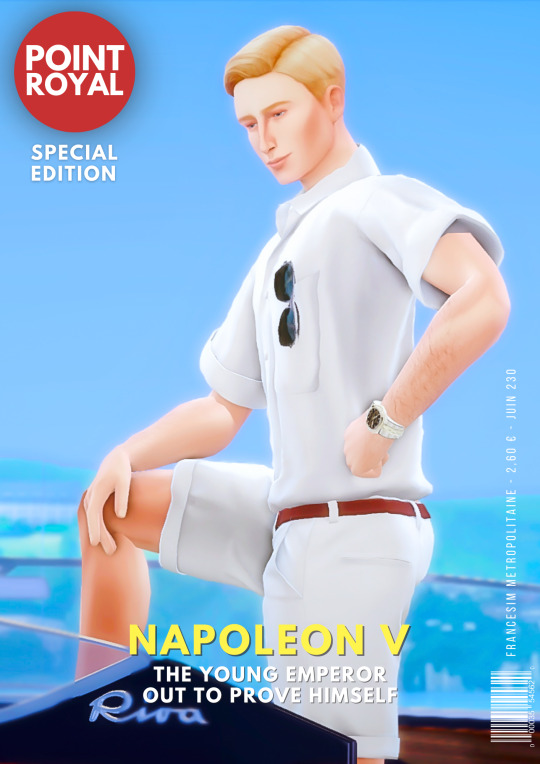
POINT ROYAL Magazine | Special Edition | Coronation: portrait of H.I.M Emperor Napoleon V, the young emperor out to prove himself
Emperor Napoleon V is one of the world's youngest rulers. Among the pantheon of Napoleons, he is sometimes compared by the French people to l'Aiglon (Napoleon II). In any case, this is the affectionate nickname that the imperial family has given him since he was a child. Soon, in a grandiose ceremony, l'Aiglon will be crowned Emperor at Notre-Dame de Paris. In the run-up to the event, we invite you to rediscover His Majesty's extraordinary first 19 years through our pages packed with illustrations and memorabilia.
Who is emperor Napoleon V?
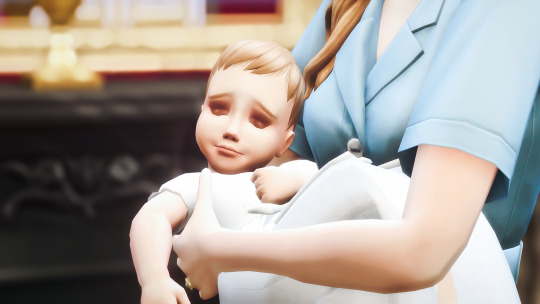
One of the first official photographs of Prince Imperial Louis, shortly after his christening.
Emperor Napoleon V was born Louis Napoleon Simparte on 22 October 2002 at the Tuileries Palace in the heart of Paris. He and his twin sister, Hortense Rose Simparte, became known as the Children of Francesim. Since the 12th century, this title has referred to the legitimate children of the French monarch. The following days, Louis and Hortense were baptised at Notre-Dame de Paris by the Archbishop of Paris.
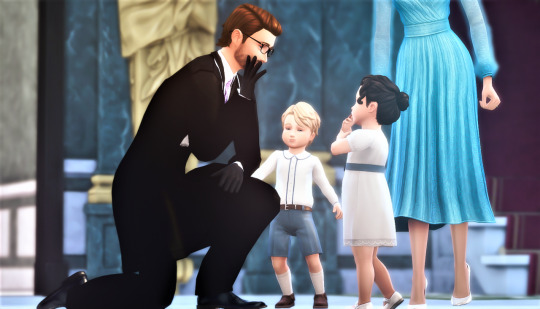
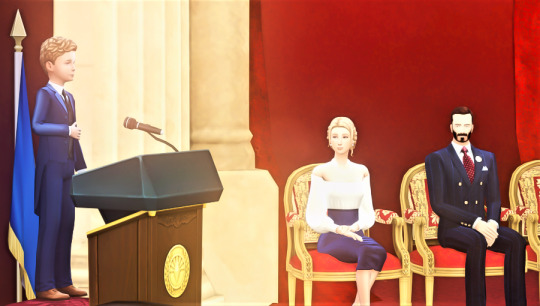
Left: As a toddler, he attended Emperor David of Pierreland's state visit to Francesim. Right: A little later, aged just 8, Louis made his first public speech on the occasion of the Napoleonic events.
From the moment he was born, the young imperial prince was already the first in the order of succession to the throne, so he was quickly associated with the Crown's public appearances and activities.
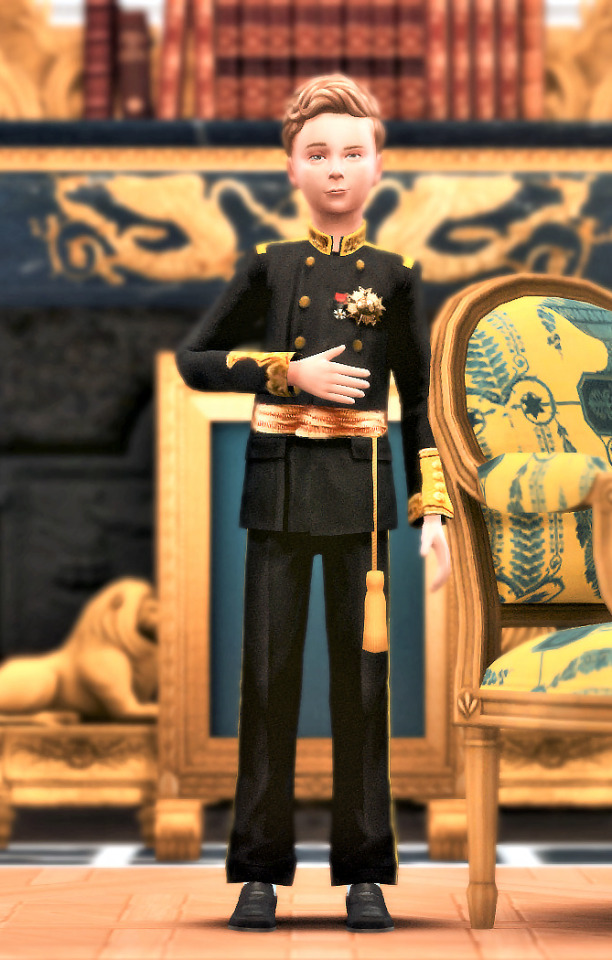
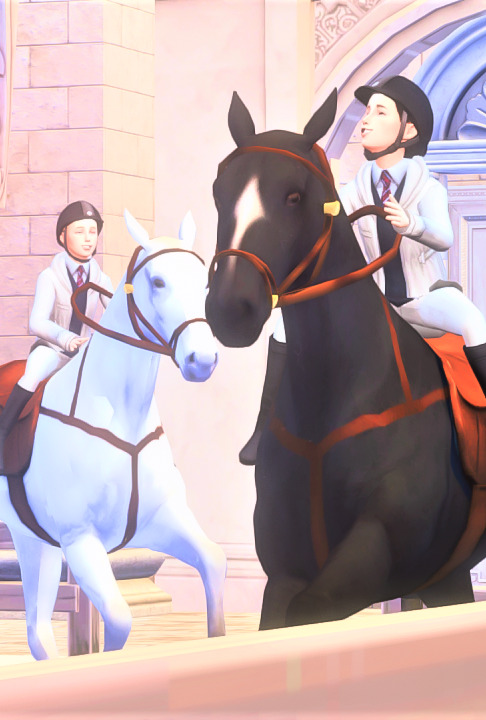
Left: 1st official portrait of the Prince Imperial wearing the Imperial Guard uniform. Right: Francesim's children receive their first riding lessons at the Versailles stables.
From an early age, Louis showed a keen interest in a military career. He wore the uniforms of the various regiments to which he belonged. Even today, the young emperor has a vast wardrobe of uniforms, which he prefers to wear instead of civilian ceremonial dress. Not surprising for a Napoleon.
Louis and Hortense have a modern educational background, having been educated at illustrious Parisian public schools such as Sainte-Barbe. Outgoing and charming, Louis has always had the profile of a charismatic leader. Unlike his sister Hortense, who was quieter and more shy, Louis always surrounded himself with friends quickly. Little is known about this period of their lives, in accordance with the wishes of the late Emperor Napoleon IV.
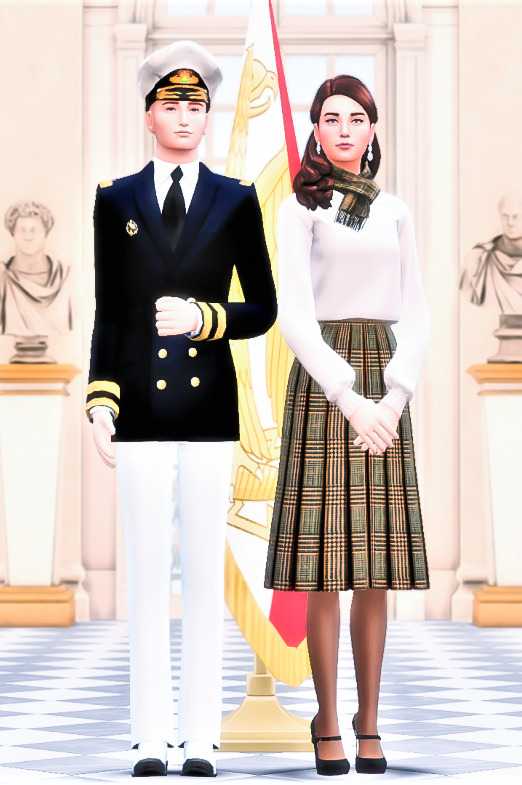
Official portrait of the Children of Francesim on their 18th birthday. The photo was taken at the Château de Meudon, the official residence of the Imperial Princes of Francesim.
Last year, Louis and Hortense celebrated their 18th birthday. It was a very busy year for the Children of Francesim: Hortense took part in her first royal activities, while Louis spearheaded the maritime alliance project between the Pierreland Empire (@officalroyalsofpierreland) and the Empire of Francesim. Together with Duke Felipe, he inaugurated the Henry submarine, which combines the expertise of both armies.
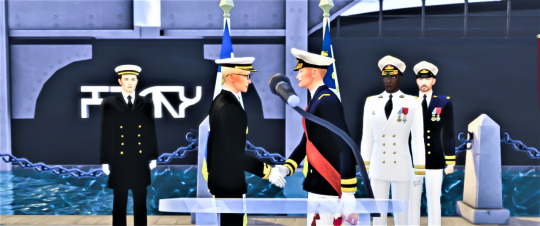
The Prince Imperial and Duke Felipe on the day of the inauguration of the Francesim-Pierreland maritime alliance.
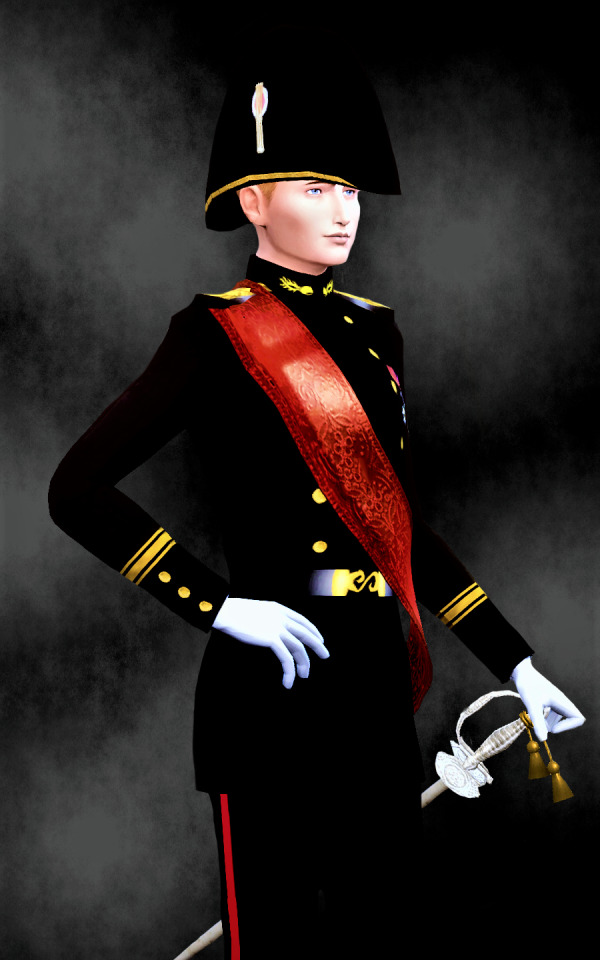
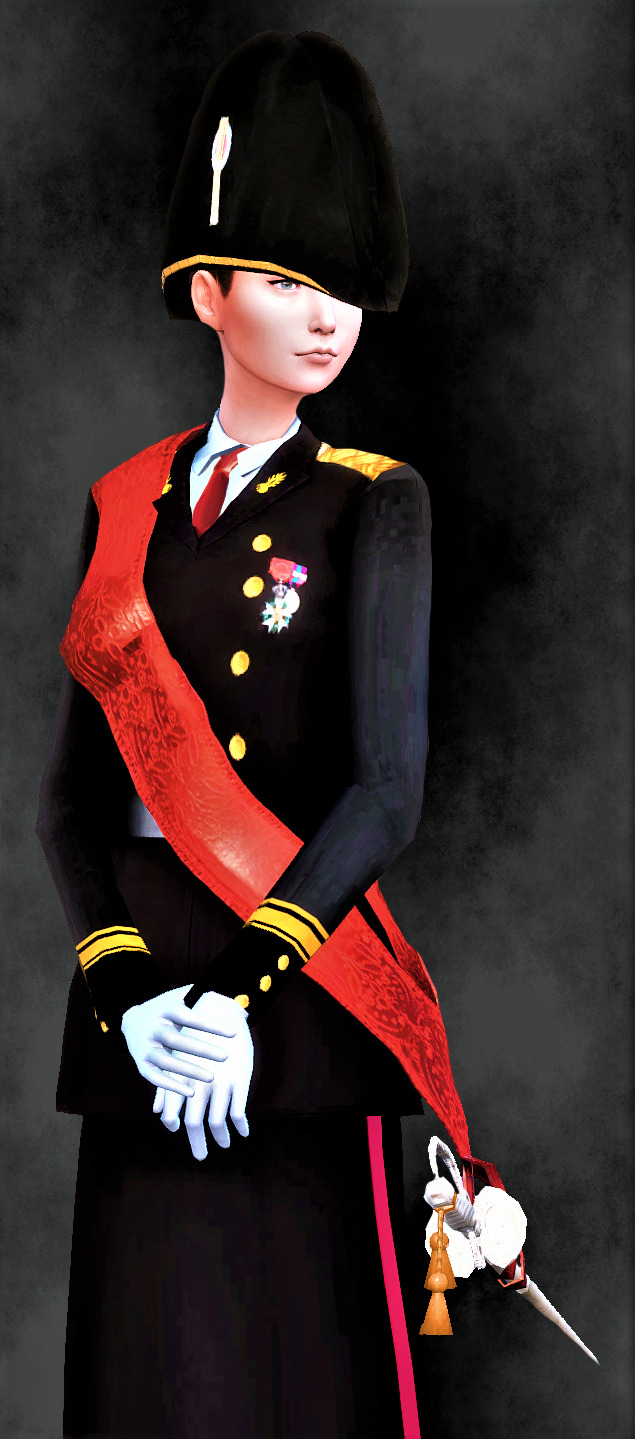
Portraits of Francesim's children taken at the Ecole Polytechnique. They are wearing the school uniform, which regularly takes part in military parades.
At the end of their respective engagements, the twins entered the Ecole Polytechnique together and became Polytechniciens. They completed their year and took part in the end-of-year gala held at the beginning of the summer at the Opéra Garnier.
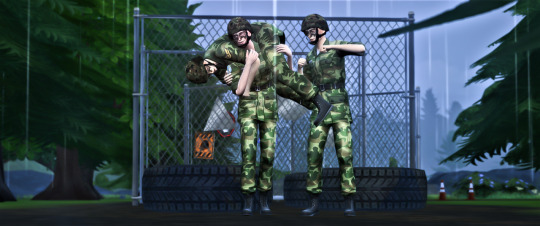
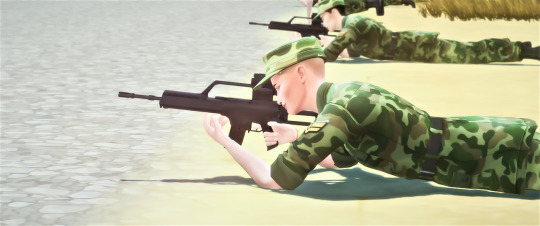
The Ecole Polytechnique offered a combination of military, scientific and economic training.
While Hortense wished to continue her scientific studies at the Ecole Polytechnique, after the coronation Louis turned to the Francesim Naval School, which trained naval officers.
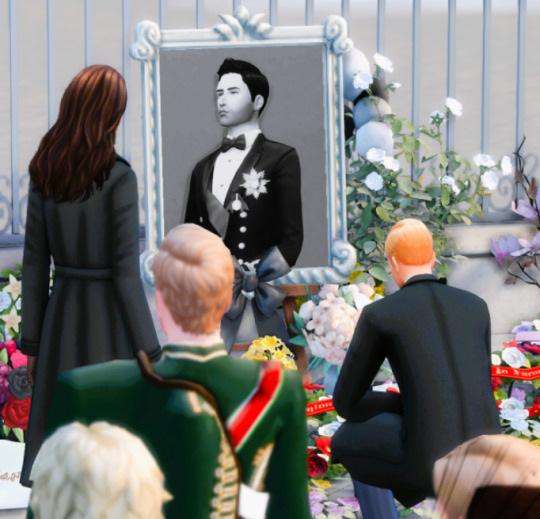
During his year at Polytechnique, Louis became Napoleon V at the age of 19, following the violent death of his father in an ambush in the middle of Paris.
The death of Emperor Napoleon IV is still shrouded in mystery, and an investigation is underway. It will give rise to an impressive trial, where many wonder whether Emperor Napoleon V will wish to sit as a judge - his imperial powers theoretically allow him to do so.
It was during the period of mourning that Napoleon V made his relationship with the future Empress Charlotte official. In fact, Their Imperial Majesties had known each other since the age of 3 and had grown up together. A little-known fact is that Charlotte accompanied Louis to the Ecole Polytechnique and even took part in military training! "Charlotte has always impressed me, she has a lot of presence, allure, and always the right words" confided Napoleon during the Cannes Film Festival, where the couple announced their engagement. He also admitted that he had long had feelings for his beloved (several years), but never dared to admit them until his father's death. The tragedy made him realise that he had to enjoy every moment of life.
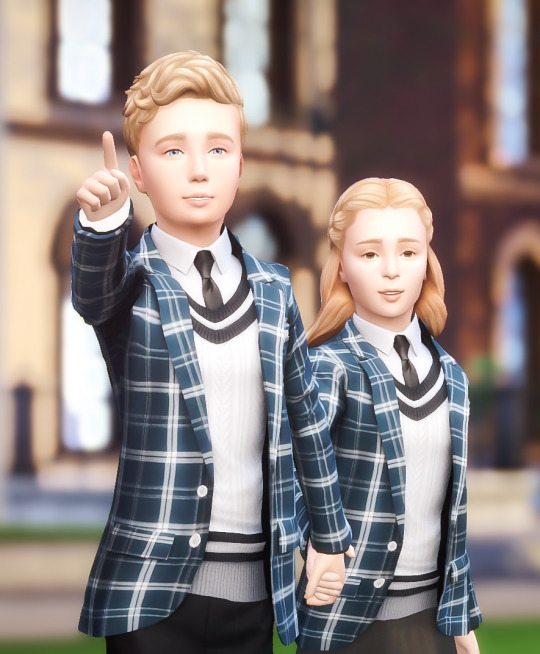

The imperial couple shared with us some rare photos of their years before the rise of Napoleon V.
Charlotte brought much joy to the young emperor, who appreciated her advice and the "Mortemart spirit". After all, Empress Charlotte is a member of the famous and noble French family of Rochechouart-Mortemart. L'esprit Mortemart is a well-known expression that praises the family's caustic, natural and fine sense of humour. The imperial couple's entourage readily acknowledged that Charlotte had inherited this characteristic wit, which has the art of giving it to others.
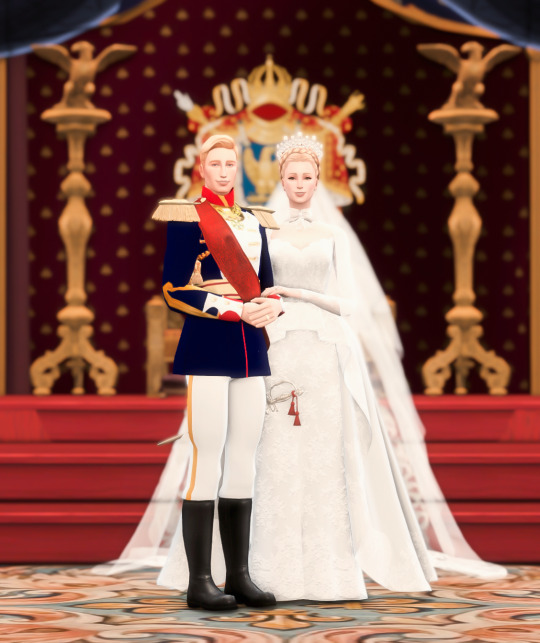
The first official portrait of the married Emperor Napoleon V and Empress Charlotte. The Emperor wears the uniform of the Imperial Guard, and the Empress has reused Madame Mère's wedding dress as a tribute to her new family.
At the beginning of June, the emperor married Charlotte. It was a marriage that may have seemed rather hasty given the young age of the couple. However, Napoleon V always made it clear that he wanted to be crowned alongside Charlotte. To do so, he had to pass through the altar, as the coronation is a partly religious ceremony. Madame Mère supported her son's determination and was delighted for him. After all, "the two of them have been looking for each other since they were children, so it was bound to happen sooner or later", she assures us. Charlotte seems to have been well received by her in-laws, although there are rumours of a disagreement between the Empress and Madame Hortense.
After a well-deserved honeymoon in French Polynesia, the lovers are now devoting their full attention to preparations for the coronation. It was a year marked by many upheavals for the emperor, who courageously faced up to the trials of life. Without a doubt, the post-coronation period will be the real beginning of Napoleon V's reign, and we can't wait to see what the emperor's next initiatives will be.
⚜ Traduction française
POINT ROYAL Magazine | Edition spéciale | Couronnement : portrait de S.M l'Empereur Napoléon V, le jeune empereur qui veut faire ses preuves
L'empereur Napoléon V est l'un des dirigeants les plus jeunes au monde. Parmi le panthéon des Napoléons, il est parfois comparé par le peuple français à l'Aiglon (Napoléon II). C'est en tout cas le surnom affectueux que lui donne la famille impériale depuis sa plus tendre enfance. Bientôt, dans une cérémonie grandiose, l'Aiglon sera sacré Empereur à Notre-Dame de Paris. En vue de l'événement, nous vous proposons de redécouvrir, à travers nos pages riches d'illustrations et de souvenirs, les 19 premières années extraordinaires de Sa Majesté.
Qui est l'empereur Napoléon V ?
L'une des premières photographies officielles du prince impérial Louis, un peu après son baptême.
L'empereur Napoléon V est né Louis Napoléon Simparte, le 22 octobre 2002 au palais des Tuileries, en plein cœur de Paris. Lui et sa sœur jumelle, Hortense Rose Simparte, portent alors le titre d'Enfants de Francesim. Il désigne depuis le XIIIe siècle les enfants légitimes du monarque français. Les jours suivants, Louis et Hortense sont baptisés à Notre-Dame de Paris, par l'archevêque de Paris.
Dès sa naissance, le jeune prince impérial est d'ores et déjà premier dans l'ordre de succession au trône et il est donc associé rapidement aux apparitions publiques et activités de la Couronne. Bambin, il a assisté à la visite d'Etat de l'empereur David de Pierreland en Francesim. Un peu plus tard, à l'âge de 8 ans à peine, Louis fait son premier discours public à l'occasion des événements napoléoniens.
A gauche : 1er portrait officiel du prince impérial portant l'uniforme de la garde impériale. A droite : Les Enfants de Francesim reçoivent leurs premiers cours d'équitation à l'écurie de Versailles.
Très tôt, Louis a manifesté un grand intérêt pour une carrière militaire. Il porte d'ailleurs depuis son plus jeune âge des uniformes de divers régiments dont il fait partie. Encore aujourd'hui, le jeune empereur possède une grande garde-robe d'uniformes, qu'il préfère porter à la place des tenues civiles d'apparat. Rien d'étonnant pour un Napoléon.
Louis et Hortense ont un parcours scolaire moderne, puisqu'ils ont été formés dans des écoles privées parisiennes illustres comme Sainte-Barbe. D'un caractère sociable et charmeur, Louis a toujours eu le profil d'un leader charismatique. Contrairement à sa soeur Hortense, plus calme et timide, Louis s'est toujours entouré d'amis rapidement. Peu d'informations sont connues de cette période de leur vie, selon le souhait de feu l'empereur Napoléon IV.
Portrait officiel des Enfants de Francesim pour leurs 18 ans. Le cliché a été pris au château de Meudon, la demeure officielle des princes impériaux de Francesim.
L'an dernier, Louis et Hortense célébraient leurs 18 ans. Une année très riche pour les Enfants de Francesim : Hortense a participé à ses premières activités royales, tandis que Louis a mené de front le projet d'alliance maritime entre l'empire de Pierreland et l'empire de Francesim. Il a inauguré avec le duc Felipe le sous-marin Henry, qui allie le savoir-faire des deux armées.
Le prince impérial et le duc Felipe le jour de l'inauguration de l'alliance maritime Francesim-Pierreland.
Portraits des Enfants de Francesim réalisés à l'Ecole Polytechnique. Ils sont dans le grand uniforme de l'école, qui participe régulièrement aux défilés militaires.
A la fin de leurs engagements respectifs, les jumeaux sont entrés ensemble à l'Ecole Polytechnique et sont devenus des polytechniciens. Ils ont terminé leur année et ont participé au gala de fin d'année qui a eu lieu au début de l'été à l'Opéra Garnier.
L'Ecole Polytechnique offre à la fois une formation militaire, scientifique et économique.
Si Hortense souhaite continuer son cycle scientifique à l'Ecole Polytechnique, Louis va se tourner après le couronnement vers l'Ecole navale de Francesim, qui forme les officiers de la marine.
Pendant son année à Polytechnique, Louis devient Napoléon V à l'âge de 19 ans, suite au violent décès de son père dans une embuscade en plein Paris.
La mort de l'empereur Napoléon IV est encore entourée de mystères, une enquête est en cours. Elle donnera lieu à un procès impressionnant, où beaucoup se demandent si l'empereur Napoléon V souhaitera y siéger en tant que juge - ses pouvoirs impériaux le permettent, théoriquement.
C'est durant la période de deuil que Napoléon V officialise sa relation avec la future impératrice Charlotte. En réalité, Leurs Majestés Impériales se connaissent depuis l'âge de 3 ans et ont grandi ensemble. Fait peu connu, Charlotte a accompagné Louis à l'Ecole Polytechnique et a même participé aux formations militaires ! "Charlotte m'a toujours impressionné, elle a beaucoup de prestance, d'allure, et des mots toujours justes, une personnalité assurée." confie Napoléon durant le festival de Cannes, où le couple a annoncé leurs fiançailles. Il reconnaîtra aussi qu'il a longtemps eu des sentiments pour sa belle (depuis plusieurs années), mais qu'il n'a jamais osé les avouer avant la mort de son père. La tragédie lui aurait fait réaliser qu'il doit profiter de chaque instant de la vie.
Le couple impérial a partagé avec nous de rares clichés photographiques de leurs années avant l'ascension de Napoléon V.
Charlotte apporte beaucoup de joie au jeune empereur, qui apprécie ses conseils et "l'esprit Mortemart". Car l'impératrice Charlotte est un membre de la célèbre et noble famille française des Rochechouart-Mortemart. L'esprit Mortemart est une expression bien connue, qui vante l'humour caustique, naturel et fin de la famille. L'entourage du couple impérial reconnaît volontiers que Charlotte a hérité de cet esprit si caractéristique, qui a l'art d'en donner aux autres.
Premier portrait officiel de l'empereur Napoléon V et de l'impératrice Charlotte mariés. L'empereur porte l'uniforme de la garde impériale, et l'impératrice a réutilisé la robe de mariage de Madame Mère afin de rendre hommage à sa nouvelle famille.
Début juin, l'empereur épouse Charlotte. Un mariage qui a pu paraître assez précipité au-vu du jeune âge des mariés. Cependant, Napoléon V a toujours assuré qu'il souhaitait être couronné aux côtés de Charlotte. Pour cela, il devait passer par l'autel puisque le sacre est une cérémonie en partie religieuse. Madame Mère a soutenu la détermination de son fils et est ravie pour lui. Après tout, "les deux se cherchent depuis qu'ils sont enfants, ça allait forcément arriver un jour ou l'autre" assure-t-elle. Charlotte semble avoir été bien accueillie par sa belle-famille, bien que certaines rumeurs soupçonnent une mésentente entre l'impératrice et Madame Hortense.
Après un voyage de noces bien mérité en Polynésie française, les amoureux se dévouent désormais intégralement aux préparations du couronnement. C'est une année marquée par de nombreux bouleversements pour l'empereur, qui a su courageusement faire face aux épreuves de la vie. Sans nul doute, l'après couronnement sera le début véritable du règne de Napoléon V, et nous avons hâte de voir quelles seront les prochaines initiatives de l'empereur.
#simparte#ts4#ts4 royal#royal simblr#sims 4 royal#sim : louis#sims 4 fr#sims 4#ts4 royalty#sims 4 royalty#sim : charlotte#le cabinet noir#episode iii#coronation#magazine#ts4 storytelling#ts4 story#ts4 simblr#sims 4 royal family#ts4 royal simblr#royal sims
50 notes
·
View notes
Text


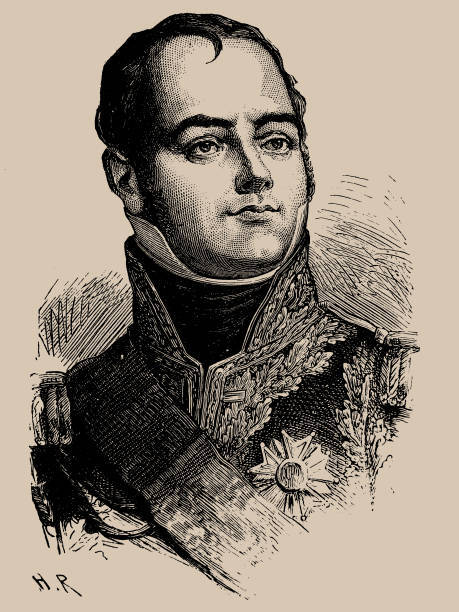
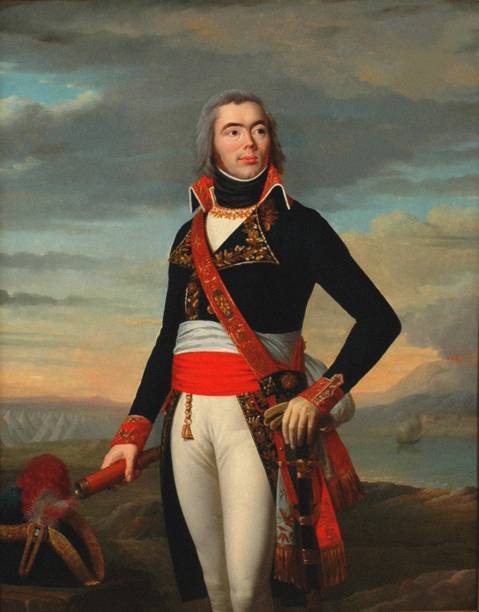
17th November 1765 saw the birth of Étienne Jacques Joseph Alexandre MacDonald at Sedan France.
This is rather a long piece about, in my opinion, a very intersting Franco-Scot. The first photo is on display at The Palace of Versaille, showing how highly the French thought/think of him.
Scots have had a long history with France, and it did not end with the French Revolution, although no doubt some may very well have become victims of the era and lost their lives and lands, others like Franco-Scot, Étienne MacDonald, would go on to show that their devotion was to France rather than to the ruler.
In 1784 the British Parliament passed the Act of Amnesty which pardoned all Jacobites, but despite this, Étienne’s father Neil MacDonald, who helped Charles Edward Stuart escape to France after the ‘45, never returned to Scotland on account of his poor health and he died in poverty 4 years later.
By this time his son Jacques MacDonald, as he was known, had already begun a promising military career in the French army, and that he would later be central to the cataclysmic events of the French Revolution, Napoleonic Wars and Restoration of the Bourbon Monarchy in France..
MacDonald began his French military career in 1786 by joining the ‘Dillon Regiment’, which was primarily composed of Scottish and Irish Jacobite exiles. The regiment remained loyal to Louis XVI at the outbreak of the revolution in 1789, which led not only to its disbandment in 1791, but the execution of its Colonel, Arthur Dillon, by guillotine in 1794. MacDonald on the other hand was personally loyal to the revolution, marrying a Mademoiselle Jacob, whose father was an enthusiastic supporter of the changes that were taking place in French society.
At the outbreak of war in 1792 MacDonald continued to serve in the new army and was offered a prestigious position as aide-de-camp to General Dumouriez. He distinguished himself at the Battle of Jemappes,and he was also present alongside Dumouriez at the Battle of Valmy. The victory of the French volunteer army at Valmy was a significant turning point in the Revolutionary Wars and it compelled France to formally abolish the monarchy shortly afterwards. By 1793 MacDonald had risen to the rank of Colonel and then refused to desert the Revolutionary Army when Dumouriez defected to the enemy. As a reward for this loyalty he was given the command of a Brigade.
By 1797 he had become a General of a Division and joined the French Army in Italy. He occupied Rome, became the governor of the city, defeated the Austrian Army of General Mack before reorganising the Kingdom of Naples into the Parthenopaean Republic. In 1801 he became the French ambassador to Denmark but did not enjoy the politics of diplomacy and he later asked to be recalled.
After returning to France, it was clear the French Republic was in crisis. Its armies were being outfought by a coalition of empires determined to destroy revolutionary ideas. Internally, France had become politically unstable and a coup d’etat was planned to overthrow the government. It was decided that a general should be part of the coup to ensure the support of the army. The conspirators first choice, General Joubert, was killed in Italy before he could be asked. General Moreau was then asked, but he refused to be a figurehead of the coup. The decision then came to MacDonald himself, and like Moreau before him, he also refused. The next choice for the conspirators was Napoleon Bonaparte, who accepted the offer and took power backed by the army and MacDonald.
Following these events, MacDonald took command of the French Army of Switzerland, an important position that linked the French armies fighting in Germany with those in Northern Italy. He fell out of favour with Napoleon after associating with his rival, General Moreau. This led to Napoleon overlooking MacDonald in his first allocation of Marshals of France around 1805.
The Napoleonic Wars continued from 1805 but MacDonald still remained without a position in the French Army. It wasn’t until 1809 that Napoleon finally allocated command of a Corps to MacDonald, also giving him the responsibility of being a military adviser to Napoleon’s adopted son, Prince Eugene de Beauharnais, the Viceroy of Italy.
The highlight of MacDonald’s career soon followed at the Battle of Wagram in 1809. MacDonald was in command of the reserve corps, and at the height of the battle he was ordered to attack the Austrian centre to relieve pressure on the other parts of the French line. Forming his 8,000 soldiers into an unusual column formation that resembled a large hollow rectangle, MacDonald advanced and successfully held off three Austrian cavalry charges. Under concentrated Austrian cannon and musket fire his Corps suffered 50% casualties and could not advance any further. MacDonald recognised that the Austrians were now disorganised because of his attack, and he ordered the French Guard Cavalry to attack and seize the opportunity to destroy the Austrian centre. General Walther, commander of the Guard Cavalry, refused to take an order from anyone other than Napoleon himself and his cavalry remained stationary. This crucial delay resulted in a lost opportunity to capitalise on the gains that MacDonald had made. Both MacDonald and Napoleon were later furious with General Walther for this decision, Napoleon even being moved to say that it was the first time his cavalry had ever let him down.
Despite the failure of the Guard Cavalry, MacDonald’s attack had sufficiently occupied the attention of the Austrians to allow the French to successfully conduct a general attack on other parts of the line. The French had won the battle and Napoleon rode directly to MacDonald and upon embracing him said,
“General MacDonald, Let us be friends henceforth. You have behaved valiantly and have rendered me the greatest services throughout the entire campaign. On the battlefield of your glory, where I owe you so large a part of yesterday’s success, I make you a Marshal of France. You have long deserved it.”
MacDonald was the first French Marshal to be created on the field of battle and he graciously asked Napoleon to let the rewards be distributed equally among the men of his corps. Napoleon said that he could not refuse him and in further recognition of his services he soon afterwards awarded MacDonald the Grand Eagle of the Legion of Honor, the title of Duke of Taranto and 60,000 francs.
Following the Battle of Wagram, MacDonald was made the Governor of Gratz, a role which he undertook with such distinction that the city wanted to pay him 200,000 Francs when he left, an offer which he refused. MacDonald was then made the Commander of the French army in Catalonia, and also the Governor-General of the principality. MacDonald had serious objections to the manner in which the French were fighting the war in Spain, which had degenerated into a brutal war between French regulars and Spanish guerrilla fighters. Putting aside his objections, he took up the role and met with mixed success. He was defeated at the Battle of Pla in 1811, but later took Figueras after a 4 month siege. Both of these battles were typical of the Spanish War in which large numbers of French troops and resources were tied down by relatively small numbers of elusive Spanish troops. Following the siege of Figueras, MacDonald experienced a sever case of gout, followed by fever. He asked to be transferred and returned to Paris, unable to walk without the assistance of crutches.
MacDonald recovered in time to be present at the French invasion of Russia in 1812, in which he commanded the X Corps and the left wing of the Grand Army. This Corps was a multinational formation, comprising Poles, Bavarians, Westphalians and Prussians. Initially the invasion met with little resistance and MacDonald was able to defend the flank of Napoleon’s invasion by routing a Russian Army near Riga in present day Latvia. Despite his Prussian infantry playing a major part in the victory, MacDonald started to become suspicious of them after they less than enthusiastically undertook his order to pursue and capture the defeated Russians.
After a series of battles Napoleon went on to capture Moscow, which had been completely abandoned by the Russians. After Moscow had been under occupation for three days, the city was set alight by a handful of Russians who had stayed behind to prepare the trap. The resulting fire destroyed 80% of the mostly wooden city and came as a terrible shock to the morale of the French army. Tsar Alexander continued to ignore all calls for surrender from Napoleon and with the French army now camped in a ruined city Napoleon had no choice but to retreat, which the Grand Army began in October 1812.
In November 1812 Napoleon learned that there had been a coup against his rule in Paris. Leaving Marshal Murat in command he left the army had hurried back to Paris to deal with the political problems that had arisen. Marshal Murat also later abandoned the army to save his Kingdom of Naples, leaving Napoleon’s adopted son the Viceroy of Italy, Prince Eugène de Beauharnais in command. MacDonald had previously been a close colleague and military mentor to de Beauharnais and they had worked closely together to secure the French victory at Wagram two years previously.
The French Army had initially invaded Russia with an Army of 450,000 men, but now the remaining 150,000 had the unenviable task of retreating from Moscow through a vicious Russian winter and temperatures of -40c. As the pursuing Russians picked away at the remnants of what was once the largest army in European history, MacDonald was trying to deal with problems within his own Corps. During the retreat he was shocked to discover that General Yorck and the Prussians under his command had defected from MacDonald’s Corps en masse, secretly leaving the army during the night. MacDonald wrote contemptuously of these Prussian’s in his memoirs but he spoke highly of the Polish, Bavarian and Westphalian soldiers of his Corps, who he described as serving faithfully, courageously and with distinction.
During the final stages of the retreat, Marshal Murat requested the advice of MacDonald on how the French Army should proceed. MacDonald recommended abandoning all territory east of the Oder River, holding the line along the river and waiting for the fresh troops being assembled in France. His advice was ignored and the retreat would continue. The total losses during the whole campaign amounted to 380,000 men, with just 35,000 Frenchmen making it home from the initial force.
MacDonald eventually did make it back to France, despite having his travelling expenses of 12,000 francs stolen from him on his way through Prussia. He received a frosty reception from Napoleon when he eventually returned to Paris. The Emperor had been led to believe that the Prussians had deserted the army because MacDonald had treated them badly. In his memoirs MacDonald also suggests that this less than cordial meeting was because Napoleon felt resentment towards his plan of abandoning all territory East of the Oder River. MacDonald left the meeting bemused and with understandable disdain that his services and devotion were met with such a lack of appreciation. However some days later, news had reached Napoleon that the Prussian Government had fully accepted the actions of their soldiers, implying that the desertions had nothing to do with the way MacDonald treated them and everything to do with an imminent Prussian declaration of war against France. He was subsequently summoned by Napoleon, who admitted that he had been misled regarding MacDonald’s actions in Russia, and that he did in fact act wisely in his dealings with the Prussian soldiers of his command.
By 1813 MacDonald was back in the field, joining the 200,000 largely inexperienced soldiers that were sent to link up with the remnants of the French Army in central Europe. A new coalition of powers, including Prussia, had rallied together to defeat Napoleon following his disastrous invasion attempt of Russia.
In the aftermath of the Battle of Leipzig, MacDonald and Prince Poniatowski of Poland were given command of a desperate rear guard action. Hopelessly outnumbered, MacDonald and Poniatowski made a fighting withdrawal through Leipzig towards a bridge across the river Elster. Learning that the bridge had in fact been destroyed by the French in the confusion of the retreat, Poniatowski attempted to swim across the river on horse back. He made it across, but the bank was steep and his horse fell with exhaustion, drowning Poniatowski in the river. As the front disintegrated MacDonald found himself being followed by a crowd of his men desperate to escape the approaching enemy. Seized by his aide-de-camp, MacDonald found a makeshift bridge of wooden logs that had been hastily constructed by a resourceful French engineer. MacDonald dismounted and began walking across the flimsy construction, but as his men began to follow him the bridge began to shake, causing MacDonald to fall into the river. Luckily he fell close enough to the shore that his feet could reach the bottom of the river but he struggled to get out because of the loose soil and steep embankment. Enemy skirmishers fired on him at point blank range before they were scared off by French musket fire on the opposing river bank.
MacDonald barely escaped with his life and upon reaching the top of the riverbank he turned to see whole companies of his men falling into the river, crying out “Marshal! Save your men, save your children!” as they were swept away to their deaths. Overcome with rage and frustration at being unable to save his men, he sat on the riverbank and wept. MacDonald recalls in his memoirs that this scene traumatised him for years after the event and that he could often hear the voices of the screaming men ringing in his ear.
MacDonald was furious with Napoleon for allowing the whole disaster to happen and he initially refused to even meet with the Emperor. Rumors subsequently spread through the army that MacDonald had been killed while crossing the river, but he survived and eventually made his way to Cologne to rebuild his shattered Corps. He remained one of the central commanders of the now hopeless French efforts to keep the allied powers from entering France. Ultimately Paris was captured by the allies in 1814. As Napoleon raced to Fontainebleau it was clear the soldiers were no longer willing to follow Napoleon on what was obviously a lost cause. MacDonald was encouraged to approach Napoleon on behalf of the army, making him aware that the soldiers wanted peace. MacDonald made these points to Napoleon at Fontainebleau, expecting the Emperor to fly into a violent rage, but was surprised when Napoleon reacted quite calmly to the fall of Paris and the reality that the starving and worn out remnants of the army could no longer go on fighting. Napoleon hailed MacDonald as a “good and honorable man” for his frankness and openness. He then turned to all those in the room and announced that he would abdicate the throne in favour of his son. Napoleon sat and wrote out his abdication, rewriting the draft two or three times. Then as Napoleon dismissed them for the evening, he threw himself on the sofa, slapped his leg with his hand and proclaimed, “Nonsense, gentlemen! Let us leave all that alone and march tomorrow, we shall beat them!” No doubt bemused by this departure from reality, MacDonald reiterated everything he had already said about the perilous state of the army. The Marshals, led by Marshal Ney then decided to mutiny against Napoleon to prevent further pointless bloodshed. Napoleon eventually yielded to the inevitable and MacDonald, along with Caulaincourt and Ney, left to personally negotiate the terms of surrender with Tsar Alexander of Russia on behalf of Napoleon.
MacDonald was to write that Tsar Alexander was gracious in victory and spoke respectfully of the French. MacDonald notes in his memoirs that aside from Marshal Ney, who was unstable and aggressive, Tsar Alexander’s conciliatory tone was reciprocated by the French Marshals. The Prussians were far less accommodating and were quick to remind the French that they were the scourge of Europe, immediately demanding compensation and providing none of the compliments that the Tsar had generously offered the French army. The other main member of the allied coalition was Austria, who was willing to allow Napoleon’s wife and son to keep their titles, but on the condition that they were prohibited from ever attaining power in France. Britain refused to negotiate at all, claiming that they did not recognise Napoleon as a legitimate authority, which was probably just as well for Napoleon who half heartedly said that you could “never trust a MacDonald within sound of bagpipes.”
Following the exchange, the allied powers were keen to ensure that the Marshals submitted to the new order. This would guarantee that the French Army would also obediently submit to the provisional government. Marshal Ney immediately submitted, but MacDonald and Caulaincourt remained loyal to Napoleon until the formal ratification of the treaty, after which time MacDonald wrote a simple statement to the provisional government saying that “being released from my allegiance by the abdication of the Emperor Napoleon, I declare that I conform to the Acts of the Senate and the Provisional Government.” This act of dignified defiance infuriated the ever scheming French statesmen de Talleyrand, whose face was said to turn pale before almost bursting with rage when MacDonald politely refused to submit until the formal ratification of the treaty.
MacDonald returned to Fontainbleu to call upon Napoleon. On the morning of the 13th of March 1814, MacDonald entered to find a despondent Napoleon wearing his dressing gown and slippers, with his head buried in his hands and his elbows on his knees. He did not stir when MacDonald entered the room, but on prompting from Caulaincourt he appeared to wake from a dream and MacDonald found him to have a sickly yellow-green complexion. Napoleon apologised and said that he had been sick all night, later evidence suggests that it was likely Napoleon had taken an overdose of opium in an attempt to try and sleep after the emotionally exhaustive events of recent months.
Again, Napoleon sat in the room, remained silent for a period of time before turning to MacDonald and saying,
“Duke of Tarentum, I cannot tell you how touched and grateful I am for your conduct and devotion. I did not know you well; I was prejudiced against you. I have done so much for, and loaded with favours, so many others, who have abandoned and neglected me; and you, who owed me nothing, have remained faithful to me I appreciate your loyalty all too late, and I sincerely regret that I am no longer in a position to express my gratitude to you except by words.”
Napoleon noted that MacDonald had always had a generous manner, never accepting large amounts of money while being an impartial ruler who brought justice wherever he commanded. Napoleon then implored MacDonald to accept the sword of the former leader of the Mamelukes, Murad Bey, which had been captured in Egypt in 1798 and worn by Napoleon at the Battle of Mount Tabor in 1799. MacDonald accepted the gift as a sign of Napoleon’s friendship and the two commanders emotionally embraced each other. It was the last time that MacDonald and Napoleon would ever meet.
I think I’ve taken this as far as I want to for this lengthy post, but there is much more to read in part two just click here!
When he died in 1840 at the age of 70 he was given a state funeral and buried in the Pere Lachaise cemetery in Paris. Pere Lachaise is where the great and good of early nineteenth century Paris were buried. 14 of Napoleon’s 26 Marshals are buried there.
Somhairle MacGill-Eain/ Sorley MacLean, wrote a poem about Marshal Étienne Jacques MacDonald of France, I shall post that later.
There are more pics in the article I took this from here https://sonofskye.wordpress.com/.../marshal-etienne.../
8 notes
·
View notes
Note
Hi,
This question is about Napoleon’s relationship with his stepson. It’s widely known that they had a good relationship and he referred to Eugene as my son while Eugene referred to him formally. Do u think there relationship was truly as good as people say?
Hi and thanks for the Ask! In short: I mostly think that, as with all things, their relationship gets more complicated the closer you look at it. When it comes to Napoleon, it's hard to separate private and political aspects, so Napoleon's personal feelings for Eugène may often have taken a back seat to political considerations.
First of all: When Napoleon adresses Eugène as "mon fils" in his letters, that is very much a formality. Charles von Baden, husband of Napoleon's adopted daughter Stéphanie de Beauharnais, is adressed the same way. Just to put things in perspective.
Of course that does not mean that Napoleon's relationship to Eugène cannot have been close. On the contrary. I keep thinking that what Napoleon had with Eugène was the closest thing to a real father-son-relationship he ever experienced, as the King of Rome was still a toddler when he saw him last, and as he barely had spent any time with him. However, father-son-relationships tend to have their ups and downs, especially when the son grows up and starts to get into his own 😊.
In Eugène's case, the "son" also became a political problem.
At the beginning, during the Consulate, I think the two well-mannered, polite and affable Beauharnais children were a great asset for Napoleon in Paris society. Eugène in particular was well-liked and had a reputation for being good-natured, personally brave, chivalrous, humble and without pretentions. The problems started with the Empire (or already with the Consulate for life), when the question of an heir grew increasingly important. Because with Eugène having played the role of Napoleon's son over several years, it's quite natural that many saw him as a potential heir (in the first place his mother, of course).
I do not know that this had ever been Napoleon's intention. I think he liked Eugène precisely because Eugène was only interested in his military career and had no political ambitions. The bigger Eugène's personal reputation got over the years, due to the fact that he administered Italy rather well, that he had the advantage of being married to a royal princess, that he gathered some prestige in the army etc., the more he became a problem, and the more potential for tensions with an increasingly irritable and suspicious stepfather.
Eugène of course was a very different character than Napoleon, and while he seems to have been truly in awe of his stepfather, he also had his own ideas about how to deal with problems (like, shooting bishops etc - not his kind of thing). He was an outwardly calm, stoic, even boring person, had a very different style of leading than Napoleon, was usually very friendly with his subordinates (there's only one scenario that I could think of where he really took offence and offended someone after an argument had escalated, and that's during the 1812 campaign), encouraged them rather than scolded them, was very willing to discuss problems and to change his mind when he felt somebody had better ideas, etc. - The way he himself was treated by Napoleon was, obviously, quite different and caused him quite some grief (there's an interesting letter from Duroc about this from 1805 that I would love to translate eventually). But this fate he shared with all of Napoleon's family and plenty of his magistrates.
As to specific disagreements: Napoleon had - more or less - promised to Eugène's wife that Eugène would eventually become king of (northern) Italy. And he did not want to keep that promise, especially after he had given Josephine the boot. On the other hand, he could not do without Eugène (or Hortense, for that matter) in his Empire, Eugène was the administrative hub not only for northern Italy but for the Italian peninsula as a whole and as far as the Illyrian provinces. Lots of tension there, especially as Auguste felt that her husband was treated unfairly - he had always done his duty, with much better results than plenty of others, and he was getting no reward for it.
There was much more tension during the final two years of the empire, especially after the Russian campaign. This campaign had greatly increased Eugène's military reputation. When Murat left the rests of the army in January 1813, Eugène had to take over command, something he considered an awful burden from the very beginning. He was showered with letters, orders, advice and (mostly) reprimands from his stepfather who sat in warm and cuddly Paris, and was unnerved by it to the point where he offered his resignation. Factually, Eugène managed to hold out in a very difficult situation, starting with barely 10,000 scared and discouraged men in a foreign country that turned increasingly hostile, and all he received for it was lecture after lecture. He must have been incredibly frustrated by it because we know he opened up to it on his journey home to his brother-in-law Ludwig, when he was finally allowed to return to his family in Milan - only to immediately raise a new army and try to fight the Austrians.
At this point, like most people in France, Eugène wanted, and expected, Napoleon to make peace with the allies. Peace at all costs. It was the only responsible thing to do. Yet Napoleon didn't. I think this also greatly contributed to Eugène's growing frustration with his stepfather.
Which brings us to Marmont and his accusations that Eugène had betrayed Napoleon in 1813. While i do think that Marmont has been misled and that the incident has been blown way out of proportion, it is true that Eugène refused to lead his army corps from Italy to France as Napoleon had ordered. He did so for good reasons because Napoleon's idea was pretty much rubbish in the first place, but fact is he did disobey a clear order, and he of course, even if he may not have admitted it to himself, had his eyes on the crown of Italy. But he wanted to receive it in the proper way, without openly betraying Napoleon: Wait until there is peace one way or another, then let's see. So he waited until Napoleon's abdication, then sent the French army home to France, then asked the Italian senat to put him on the throne. Which caused bloody uprisings in Milan, and Eugène had to flee the country.
That being said: Robert Wilson writes in his diary that Eugène cried when he received a letter by Hortense relating Napoleon's abdication. So, I guess all the political disputes had not killed the personal affection.
Eugène also will be the one trying to contact Napoleon on Elba, he seems to have contacted him from Vienna during the congress, he seems to have tried to contact him before Napoleon was sent to Saint Helena. Eugène will be the one sending money to Saint Helena, he will be the one publicly protesting to the monarchs against the way Napoleon was treated on that island. He did act like a son towards him until the end.
As to Napoleon: I'm not sure what he really thought about him. I don't think he could respect somebody who did not have the ambition and ruthlessness he himself was so proud to possess. (Obviously, I feel exactly the opposite 😋.)
Summing up: No, it was not always a rosy relationship but it was in fact a father-son-relationship.
Sorry for the long rambling, and thanks once more for the question!
16 notes
·
View notes